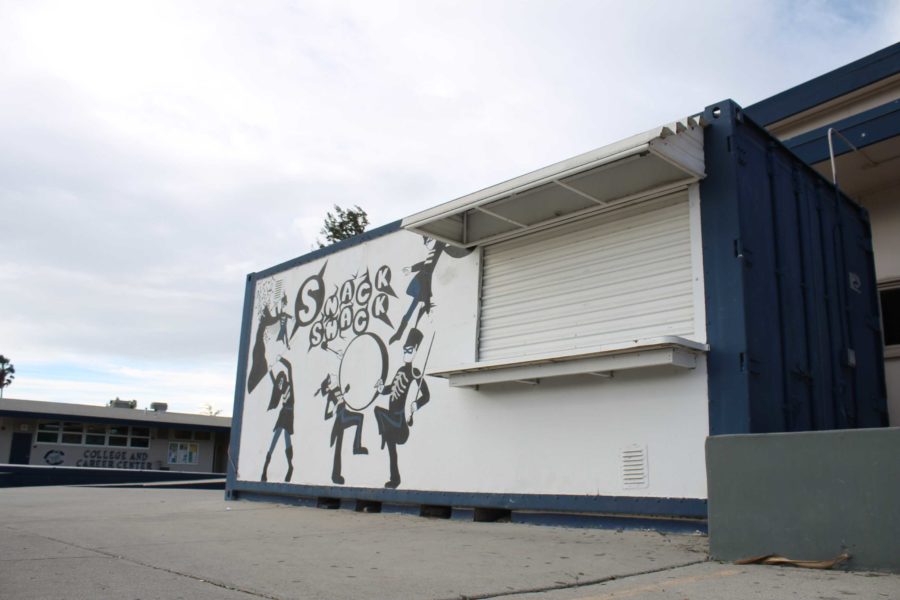Biting Off More Than They Can Chew
The Snack Shack, next to the band room, is one of the few places that snacks or drinks can be sold after school.
Notices from ASB have struck a blow in club efforts of ‘food fundraising’ after school at Cam High. Previous education laws have been updated, banning schools in California from selling food during school hours to prevent school cafeterias from losing revenue and to provide students with healthier choices. School clubs have traditionally relied on food sales as a primary fundraiser, but recent decisions relegated them to selling items only after school.
The restrictions do not apply to ‘food fundraising’ before school hours. But selling food at that hour was a Herculean task for most groups forcing them to set up tables or booths, marketing the food and having enough traffic to make it worthwhile. “With approval from ASB and with a potential fundraiser form, before school is still an option for selling food items”, said the notice created by ASB advisor Mr. Michaeltore Smith.
Smith was unavailable for comment as of this writing.
Education laws in California currently bar schools from selling food during school hours, mostly because the food choices offered are not healthy ones.
Clubs used to have the ability to sell foods during lunch hours on specified days, such as Oktoberfest sponsored by the German Club. Oktoberfest was a day in which clubs would set up food stands all around the stage with a German band playing.
“I don’t think it’s fair because we weren’t allowed to fundraise like in previous years with Oktoberfest,” said German Club treasurer Troy LeDuc, senior.
KIWIN’s, one of the largest clubs at school, are fighting the rules from the office. “The KIWIN’s are disappointed,” said advisor Mr. Tommy Taketa, counselor at Cam High. “Unfortunately, we can’t sell anything after school because of the notice.”
Not only are advisors who staff the clubs startled about the recent change in rules, but their clubs’ student hierarchy as well. “I think this is really unfair, a lot of the money at CSF goes to scholarships it’s not helping and making things worse, because now things are going to cost more for the clubs,” said senior Sheyda Mesgarzadeh.
Band Boosters remains unaffected by the change because of a number of deals made with the administration and status set by Mr. Glenn Lipman, principal, a few years ago. “We took it over four years ago when nobody was doing it,” said music director Mr. John Stava. “We worked a deal for the after school stand. If we took it, we could develop it, and we could have it.”
Band currently does not receive funding for purchasing materials. Band Boosters must resort to rigorous fundraising activities, one of which is the food stand after school.
The only restriction in place to afterschool food is that the forms must be approved by ASB and the front office. Previous deals with band, who used to be the only ones willing to develop an afterschool student-run food stand, stand as one cause for the complications. “It’s not that selling food after school is 100% off limits,” said Dr. Kim Stephenson, associate principal.
In addition to all other stipulations each club that would like to fund raise selling food items must first get permission from Lipman.
Karina Wang, senior, contributed to this story.

















































































![Senior Ditch Day... Relaxation or Truancy? [Video]](https://achsstinger.com/wp-content/uploads/2017/10/IMG_7119-900x599.jpg)
![Heavy Rain Hits Cam High [video]](https://achsstinger.com/wp-content/uploads/2017/02/maxresdefault-900x506.jpg)



